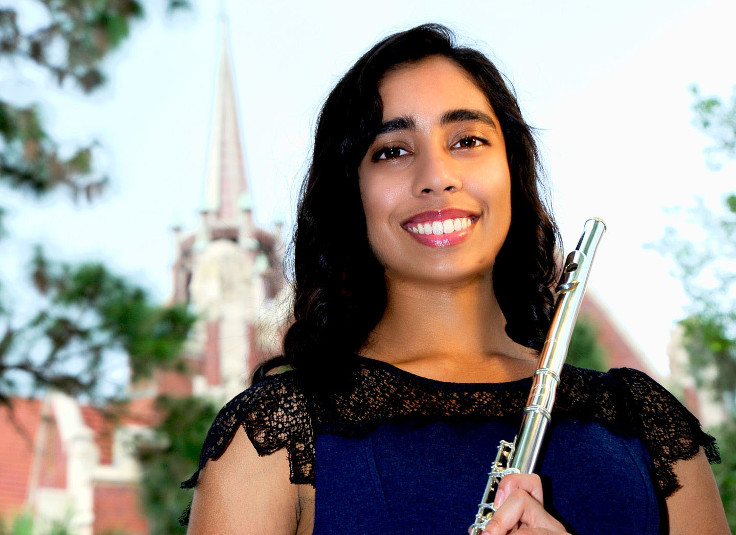This aspiring doctor embraces music, sport and history.
Sujaya Rajguru ’19, an ambitious pre-med and history sophomore from Lakeland, Fla., is preparing herself for a life as a physician in the most realistic way: by filling up every bit of her free time.
“I definitely don’t just stay home and study every day throughout the week,” says 19-year-old Rajguru. After coming to UF with a fair number of AP classes, Rajguru has some spare time normally spent taking core courses. “Working hard is an important value to me,” she says. “Staying disciplined and focused is important.” That she does. Firmly against stereotypical student types, Rajguru is both the artist and the athlete. She plays piccolo in the marching band and writes poetry; she also plays basketball.
“History teaches you how society works and how people are. I think it’s important to have that kind of balance. when you’re a doctor, you don’t just work with science, but you also work with people. it’s really important to understand both.”
Naturally, this Renaissance woman wants a well-rounded understanding of the world. Rajguru’s education in European and American history has taught her how to communicate with people from different backgrounds in Western culture. “History teaches you how society works and how people are,” she says. “I think it’s important to have that kind of balance. When you’re a doctor, you don’t just work with science, but you also work with people. It’s really important to understand both.” That understanding of humanity is crucial to Rajguru’s volunteer work at UF’s Center for Movement Disorders and Neurorestoration, where she shadows neurologists working with patients who suffer from tremors. “It was fascinating to learn about the advances being made in medicine and how we will be able to better help these people in the future,” she remarks.
The Center is an appropriate position for the aspiring neurologist, who was inspired by her home life: “My father is a neurologist, so I have grown up around medical terminology. He would talk to me about patients and how he would help them. I learned the basics about stroke, Parkinson’s disease, etc. very early on. It has become fun to be able to communicate with my father on this level.”
Indeed, Rajguru is big-hearted and occasionally shares her emotions through poetic expression. In January, she won second place in the Florida Collegiate Honors Council’s Writing Contest in Poetry. “The poem is written from the perspective of Hester Prynne [from The Scarlet Letter], how through her circumstances and the downfall of her character, her heart turns to stone figuratively.” For Rajguru, such an exercise in empathy is a critical part of her training to be a physician.
“When you’re a doctor, you aren’t just working with mice and bacteria. You have to interact with patients. I’ve learned more about the patient–physician interaction in my shadowing, and it’s crucial to understand people in general and, specifically, the background that they come from.”
